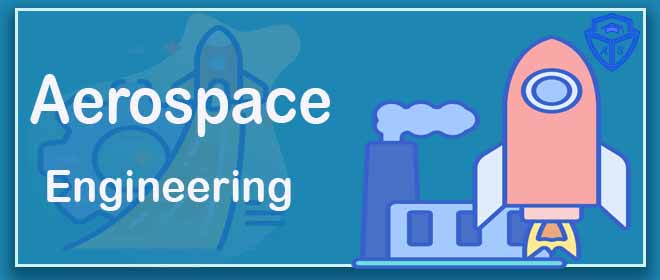
Aerospace Engineering
Updated On 28 Mar,2025

Aerospace Engineering is a specialized branch of engineering that focuses on the design, development, testing, and production of aircraft, spacecraft, and defense systems. This field integrates principles of mechanical, electrical, materials science, and computer engineering to create cutting-edge aviation and space exploration technologies.
Why Choose Aerospace Engineering?
| Benefits | Details |
|---|---|
| High Demand | Opportunities in aviation, space research, and defense sectors. |
| Global Career Scope | Jobs in NASA, ISRO, Boeing, Airbus, DRDO, and more. |
| Interdisciplinary Applications | Integration of AI, robotics, and aerodynamics. |
| Attractive Salaries | Competitive pay and career growth in government and private sectors. |
Eligibility Criteria for Aerospace Engineering
Educational Requirements
10+2 (PCM) with a minimum of 50-60% marks (varies by institution).
SC/ST/OBC candidates may have relaxations (40-50%) in some institutions.
Age Limit
Minimum Age: 17 years.
Maximum Age: Varies by institution and entrance exam criteria.
Entrance Exams for Aerospace Engineering Admission
| Exam | Institutes Covered | Exam Level | Mode of Exam |
|---|---|---|---|
| JEE Main & JEE Advanced | IITs, NITs, IIITs | National | Online |
| BITSAT | BITS Pilani, Goa, Hyderabad | University-Level | Online |
| VITEEE | VIT University | University-Level | Online |
| MET (Manipal Entrance Test) | Manipal Institute of Technology | University-Level | Online |
| SRMJEEE | SRM University | University-Level | Online |
Aerospace Engineering Entrance Exam Success Rate
Top Colleges for Aerospace Engineering in India
| Category | Top Colleges |
|---|---|
| IITs | IIT Bombay, IIT Kanpur, IIT Madras |
| NITs | NIT Trichy, NIT Surathkal, NIT Warangal |
| State Universities | IIST Thiruvananthapuram, Punjab Engineering College, Jadavpur University |
| Private Universities | BITS Pilani, VIT Vellore, SRM University, Manipal Institute of Technology |
Top Aerospace Engineering Institution Worldwide:
- Massachusetts Institute of Technology (MIT): https://www.mit.edu/
- California Institute of Technology (Caltech): https://www.caltech.edu/
- University of Michigan, Ann Arbor: https://umich.edu/
- Stanford University: https://www.stanford.edu/
Georgia Institute of Technology: https://www.gatech.edu/
Specializations in Aerospace Engineering
| Specialization | Focus Area |
|---|---|
| Aerodynamics | Study of airflows and their effects on aircraft design. |
| Propulsion Systems | Jet engines, rocket propulsion, and fuel efficiency. |
| Avionics | Electronics and communication systems in aircraft. |
| Spacecraft Technology | Design and development of satellites and spacecraft. |
| Materials & Structures | Lightweight, heat-resistant materials for aerospace applications. |
Growth in Aerospace Specializations (2025-2030)
Career Opportunities in Aerospace Engineering
Top Hiring Companies & Organizations
| Category | Companies/Organizations |
|---|---|
| Government Sector | ISRO, DRDO, HAL, NAL |
| Private Sector | Boeing, Airbus, Lockheed Martin, Rolls-Royce |
| Aviation Industry | SpiceJet, IndiGo, Air India, Lufthansa |
| Space Research | NASA, SpaceX, Blue Origin, Virgin Galactic |
Job Roles & Average Salaries
| Job Role | Average Salary (INR LPA) |
|---|---|
| Aerospace Engineer | ₹6-15 LPA |
| Avionics Engineer | ₹7-18 LPA |
| Flight Control Engineer | ₹8-20 LPA |
| Space Research Scientist | ₹10-25 LPA |
| Aircraft Design Engineer | ₹6-14 LPA |
Aerospace Engineering Salary Trends
Admission Process for Aerospace Engineering
Step-by-Step Guide
✅ Choose the Right Entrance Exam – JEE, state-level, or private university exams.
✅ Apply Online on the respective university or entrance exam websites.
✅ Prepare for the Exam – Study NCERT books, solve mock tests, and consider coaching.
✅ Appear for the Exam – Secure a high rank for better college options.
✅ Participate in Counseling – Choose colleges based on preference and ranking.
✅ Submit Documents & Pay Fees – Finalize admission after verification.
Scholarships & Financial Aid
| Scholarship | Eligibility | Coverage |
|---|---|---|
| ISRO Scholarship | Aerospace & Space Engineering students | Tuition fees + stipend |
| Central Sector Scheme | Meritorious students from low-income families | ₹10,000 per year |
| AICTE Pragati Scholarship | Female students | ₹50,000 per year |
| DRDO Research Fellowship | Aerospace R&D students | ₹25,000 per month |
Future Scope of Aerospace Engineering
Top Emerging Technologies
| Technology | Industry Application |
|---|---|
| Electric & Hybrid Aircraft | Fuel-efficient, eco-friendly aviation. |
| Reusable Rockets | Lower-cost space exploration. |
| Autonomous Drones | AI-powered, self-navigating UAVs. |
| Hypersonic Travel | Ultra-fast commercial flights. |
Projected Industry Growth (2025-2035)
- Global aerospace market expected to grow at 6.5% CAGR.
- Increased investment in space tourism and private space missions.
- Growing demand for UAVs (drones) in military and commercial applications.
FAQs about Aerospace Engineering Admission
What is the best entrance exam for Aerospace Engineering?
JEE Advanced for IITs, BITSAT for BITS Pilani, and VITEEE for VIT Vellore.
Which college is best for Aerospace Engineering in India?
IIT Bombay, IIT Kanpur, and IIST Thiruvananthapuram are top choices.
Can I become a pilot after Aerospace Engineering?
No, pilot training requires a Commercial Pilot License (CPL), not an engineering degree.
What are the job prospects after Aerospace Engineering?
Jobs in aviation, space research, defense, UAV technology, and propulsion systems.
Is Aerospace Engineering a tough course?
It requires strong mathematics, physics, and problem-solving skills, but with dedication and interest, it is achievable.
Final Thoughts
Aerospace Engineering is a highly rewarding and future-proof career path with immense opportunities in aviation, space exploration, and defense. As technology advances in areas like hypersonic travel, AI-driven aircraft, and reusable rockets, the demand for skilled aerospace engineers is rising.
For admission updates, career advice, and guidance, stay connected with Admission Solver!